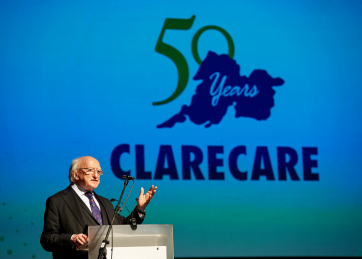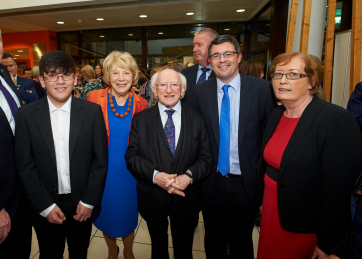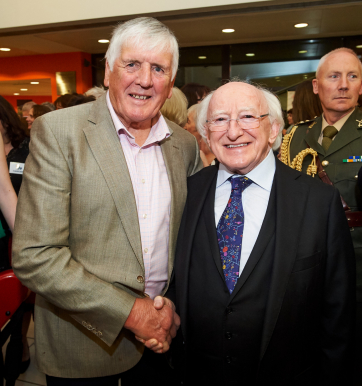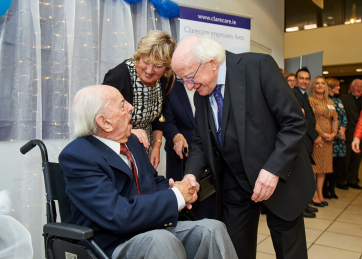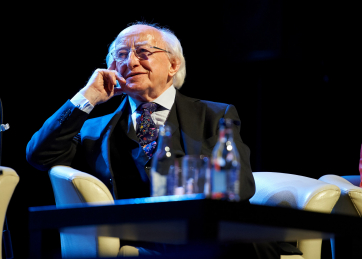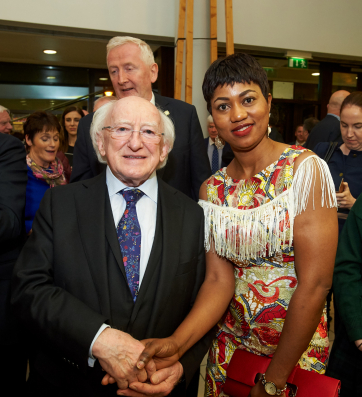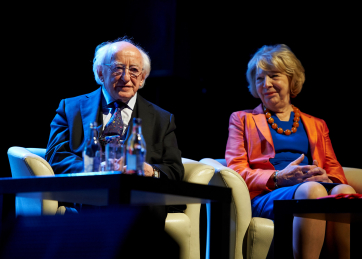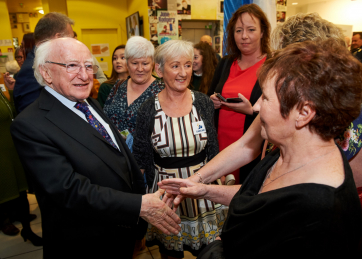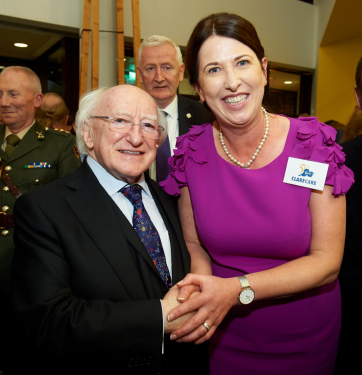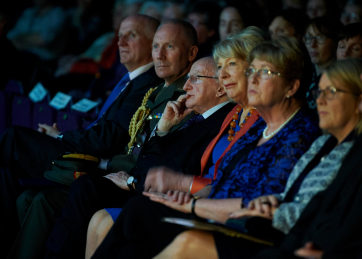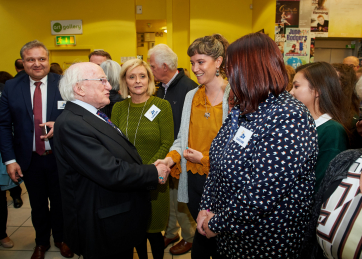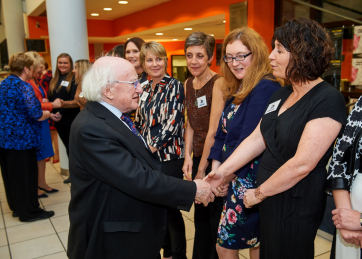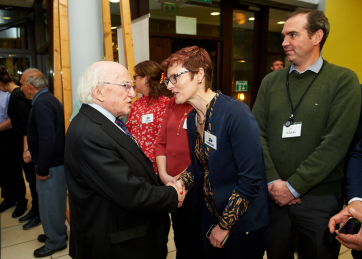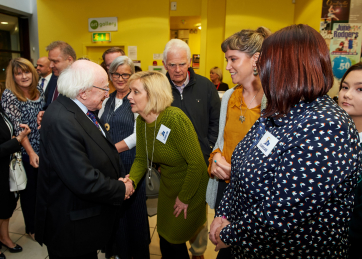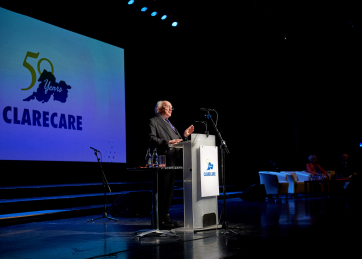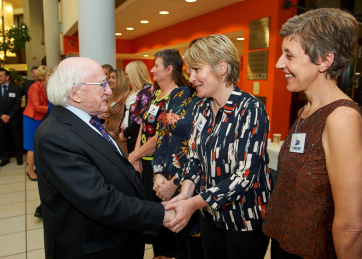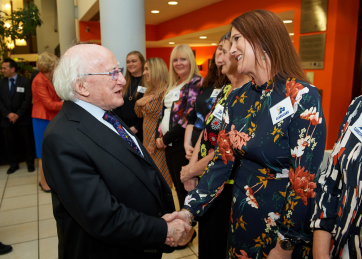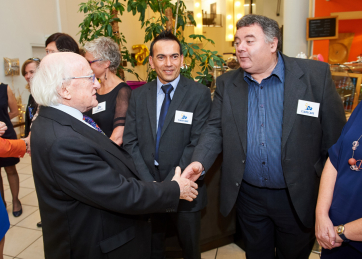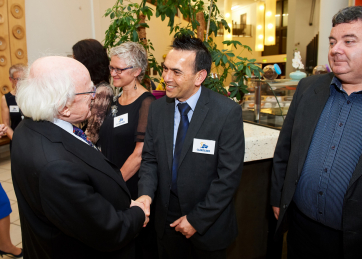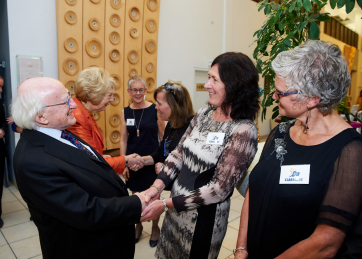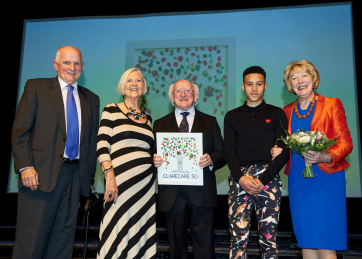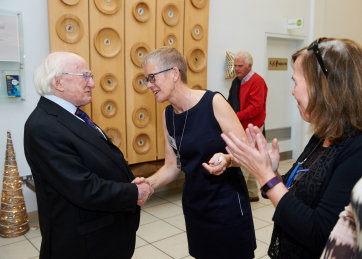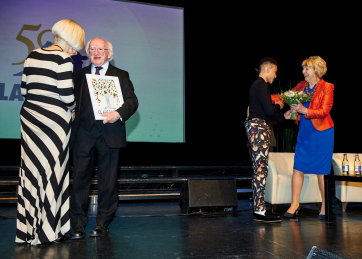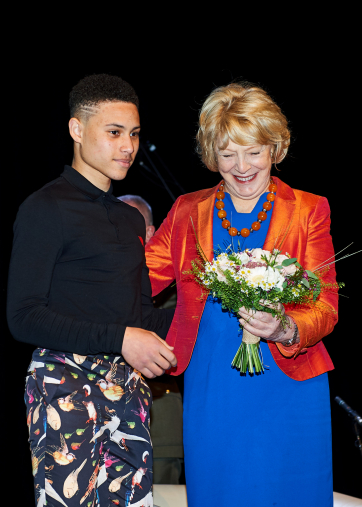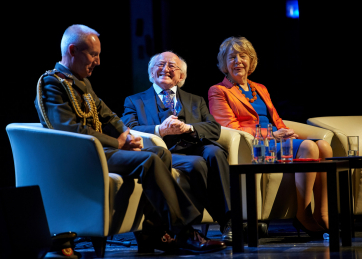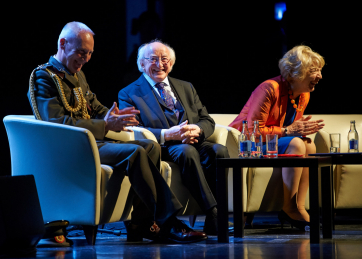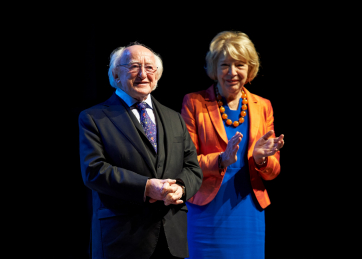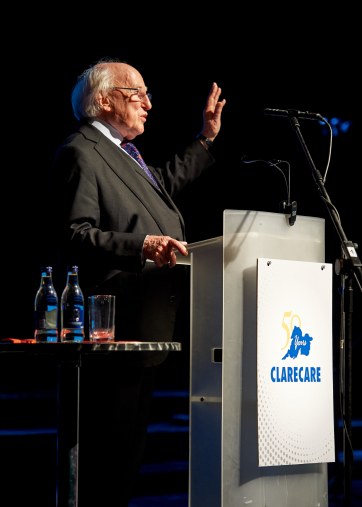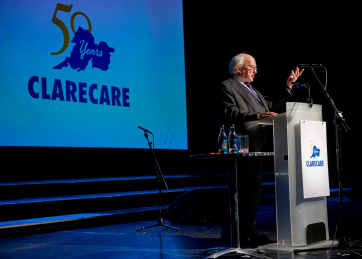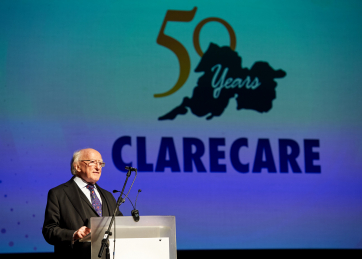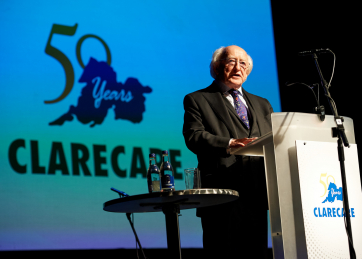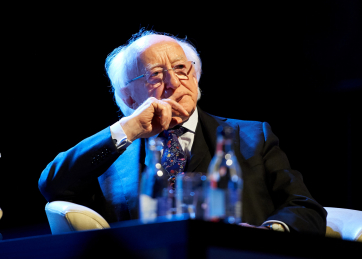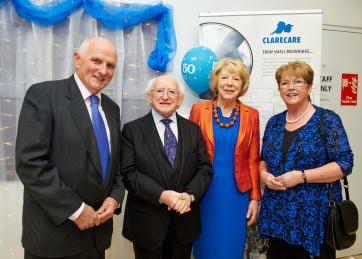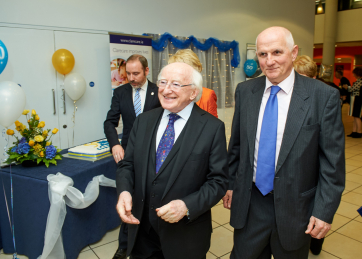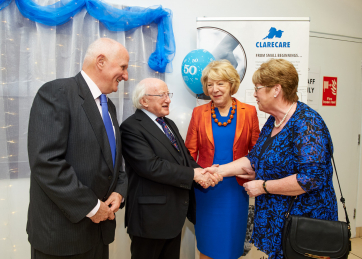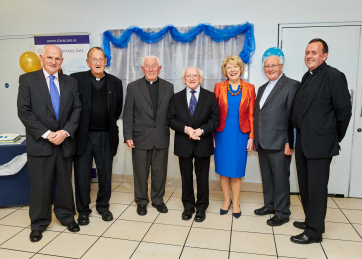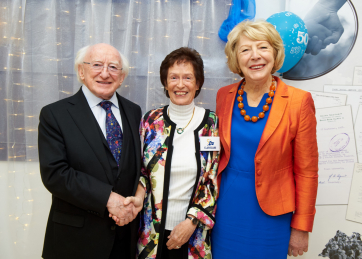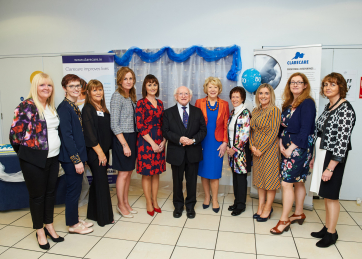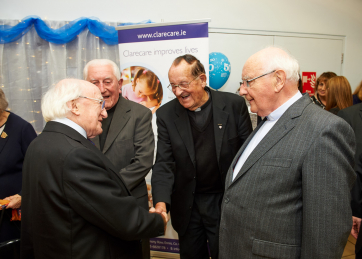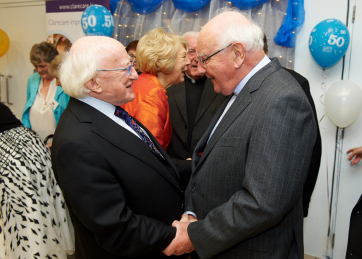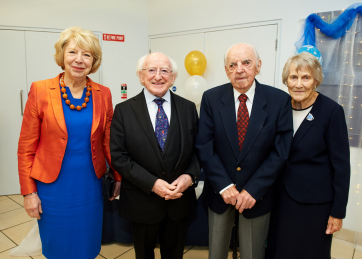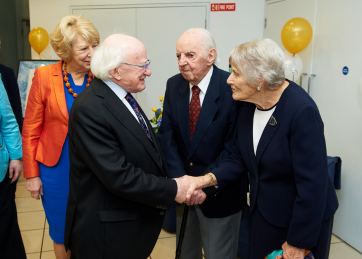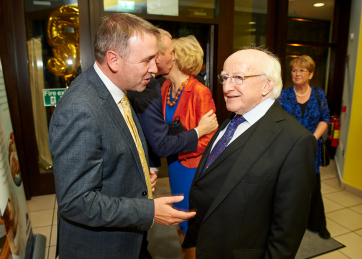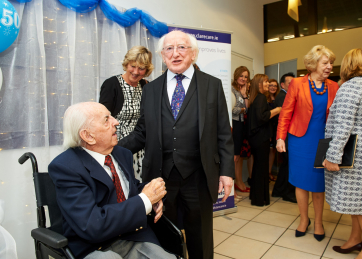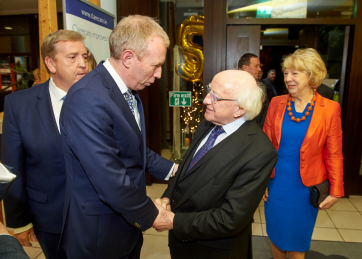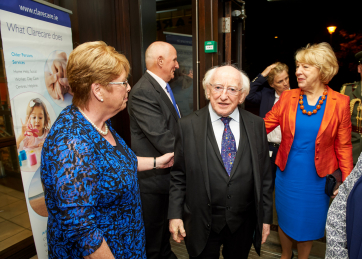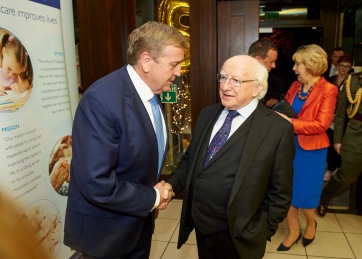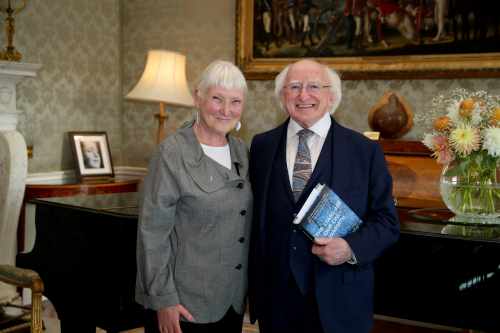Speech at the launch of Limerick’s Migrant Integration Strategy
Thomond Park, Limerick, 28 September 2018
A Mhéara,
A Chomhairleoirí,
A dhaoine uaisle,
A chairde,
It is a great pleasure to be here today, for the launch of Limerick’s Integration Plan - Belonging to Limerick. May I extend my thanks to Mayor Collins and Limerick City and County Council and to the Limerick Integration Working Group and its members for the invitation to speak here today. The immense effort that serves as background to this endeavour is clearly evident, and I must thank all of those who have given so much of their time to this strategy and organising this event.
Mar is eol do roinnt agaibh, rugadh i Luimneach mé agus is anseo a chaith mé m'óige. Mar a deir an straitéis, is le Luimneach muid, agus tá scéal againn ar fad faoin chaoi ar tháinig muid anseo.
[As many of you may know, I was born in Limerick and spent some of the early years of my life here. My father spent most of his life here. My mother and my sisters lived here in Limerick City, and indeed at ten different addresses. I was five and my brother four when we went to live in Co. Clare with my uncle and aunt, but we all belong to Limerick, as the strategy suggests, and each of us has a story of how we came to be here.]
From the earliest times Irish people have been migrants or have been receiving migrants. The River Shannon, on which Limerick City sits, has been the portal for so much of our history.
From the arrival on this island of ancient peoples in the Mesolithic and Neolithic periods, through the copper and bronze ages, the foundations of today’s Ireland society were laid. While many of these peoples are known to us only through archaeology and mythology, Tuatha Dé Danann, The Milesians or Gaels, Na Fir Bolg, Na Fianna, they are a crucial part of our story.
We perhaps know more about the Vikings, the Normans and British colonial settlers who followed them, and who are also imbedded in our identity. The tragedy of the famine and its cataclysmic impact on our nation, our long struggle for independence, the movement of people to and from this island have all been integral components of our nation’s journey.
While the experience of leaving, rare returns, exile is deep in our psyche, in a sense our people abroad have never left. Finding time beyond their own necessary efforts to belong they have stayed conscious of all the efforts at home in Ireland.
Would our journey to independence have been the same without the engagement of the Irish diaspora around the world? Certainly not. How would our nation look today had it not been for the departure of so many of our kin, fleeing the ravages of famine? What structure would our society have today were it not for the influx of the Vikings? What shape and form would it have taken without the conquest by Britain and centuries of movement between the island of Ireland and Britain throughout history?
Running through the varying answers we might give to such questions emigration in particular is deeply embedded. We have not only so many tales of departures and exile, but in the modern period of people leaving our shores in search of better futures. Limerick itself was, of course, the scene of one of the most famous exoduses in Irish history - the departure of the Wild Geese.
At the end of the siege of Limerick in 1691, it was the Jacobite Commander, Patrick Sarsfield, whose name is of course enshrined in Limerick’s story and remembered through being bestowed on Sarsfield Barracks, who negotiated the treaty which stipulated that Sarsfield and his soldiers could withdraw to France.
Over ten thousand of Sarsfield’s soldiers, along with their wives and children, left Ireland upon the signing of the treaty. The majority of them would never return to Ireland - a heavy price to pay for their defeat. They, and others like them, would go on to fight on behalf of several European kings. They carved out their place in their new societies with reputations as brave soldiers. Yet, theirs must have been an immense pain in leaving:
The Wild Geese were, as we know only too well, not the last to experience involuntary exile. Generation upon generation have left our shores in search of opportunity and a security that they could not find at home.
The impact of these departures was often felt most acutely by those left behind. Rarely by choice, more often out of necessity, brothers, sisters, fathers, mothers and cousins, departed our isle. Few Irish people cannot point to someone in their family that has left for America, Britain or Australia.
In fact, in coming to Limerick today, and being welcomed by Mayor Collins, I was reminded of the return to our shores of one of the most famous members of this Irish diaspora. In 1963, Limerick hosted President John F. Kennedy as he toured Europe at the height of the Cold War. He was welcomed by the then Mayor of Limerick, Frances Condell. In many ways, President Kennedy represented the achievement of perhaps the highest aspirations of Irish people who left our shores over the centuries.
During that visit, President Kennedy opened his remarks by addressing his “fellow citizens of Limerick”, openly acknowledging the strong connection that he felt with the thousands who had come to see this fascinating American president, and most distinguished representative of the Irish diaspora.
Kennedy has been seen as a powerful symbol of what is possible for immigrants and their children, a man who considered himself to be, and was recognised as being, an American and part of American society, yet maintaining a happy and accepted connection with his familial roots. My hope is that immigrants to Ireland, and their children in generations to come, can in a similar fashion combine their ambitions and identities to the benefit of us all.
We too must hope that immigrants to our cities and country are accepted and be enabled to establish a strong connection to our island, becoming integral parts of our shared communities and to the ongoing story of our nation.
We must, as did the people of America in the case of the Kennedy family and so many others, accepting and embracing the varied heritage of our newly arrived and their children and descendants to come.
We do best when we make the effort to understand and accept the complexity of identity. Moving on from simply “tolerating” differences, we can embrace and celebrate what makes the newest “citizens of Limerick” unique, understanding the importance of seeing culture as a process open to change in accordance with time, place and history, no one strand being asked to cede its identity to another.
As a State, we have moved from seeking to find our place on the global stage following independence, to one that is respected globally and that presents an attractive image of hope and opportunity to many around the world. In the early 1990s, as Ireland entered a new era, an era of economic growth, the direction of travel began to change. We began to welcome more people to our shores, than we farewelled.
The population of Ireland has grown substantially, with Limerick as no exception. In the twenty years from 1996 to 2016 Limerick’s population has grown by over 18%. Some of this growth can be attributed to migration. Today, people born outside Ireland account for just under 10% of the population of Limerick City and County.
People have come from near and far to become active members of Irish life and society. We have seen the return of the Irish diaspora, retracing the footsteps of their ancestors. We have welcomed people from Poland, Lithuania, America, France, Britain, Romania, Nigeria, Latvia and Brazil amongst others.
Like all of us on this planet, like us Irish, these peoples have never been sedentary. The human condition is one of constant movement and migration. In Ireland we know that as we have been on the move ourselves for countless generations.
Each of these newly arrived members of communities to our shores has contributed to our society and our development as a nation and strengthened Ireland’s relationship with their home nations. I recently had the opportunity to visit both Latvia and Lithuania, the home countries of two of the largest migrant communities in Ireland today. I must note however, with some regret, that the arrival of our Brazilian community has not led to the proportional change in our footballing fortunes for which we had hoped – but we certainly hold on to hope for the future!
I doubt that at the time of my own early years in this city many could have foreseen the change in Limerick’s fortunes that was to come. For Limerick to move from the hard times that it was then experiencing, to a position where people are coming from all over the world in search of the opportunity that the city now has to offer, is a remarkable turnaround and one that should be celebrated. Limerick has become a home for migrants, a home for their hopes and aspirations.
Limerick’s new integration plan is such a strong statement of the real will that exists to ensure that all those making new homes for themselves and their families are enabled to become full participants in the life of Limerick, and in the shaping of a shared future.
I note that at the very heart of the plan has been a determination to ensure that it is strongly based on the voice and experience of migrants themselves who have made Limerick their home. Indeed, I was inspired to read a quote from a member of the migrant community in Limerick, who said:
“I feel like I belong in Limerick. I want to be part of the solution”
This is truly uplifting, and I encourage you all to go beyond just feeling that you belong to Limerick but to be confident that Limerick belongs to you.
I am particularly pleased to hear that many of those who have generously offered their voices and shared their experiences are here today.
This strategy, of course, is not aimed solely at Limerick’s migrant community, but at the entire community of Limerick who have so much to gain by welcoming those from other nations who wish to become full participants in the life of Limerick, offering their talents, skills and perspective for the benefit of all.
Of course, there are challenges for both Irish and immigrant families, and there is much work to be done to ensure that this City and County can respond adequately to the needs of all who live here.
This strategy is a process, part of an ongoing effort, and indeed it seeks to complement the national Migrant Integration Strategy. It is encouraging to see such a proactive approach on the part of Limerick. Local Authorities, and indeed local organisations, are after all at the coal-face of integration – they have the great responsibility of working together to fulfil the aim of a society where all are accepted and can flourish, unhindered by prejudice.
Inherent in a successful response to inward migration to our country is the need to emphasise, at all times, our shared humanity. Regardless of where we are born, each of us is motivated by hopes, fears and aspirations that share similarities in the fears and insecurities that have to be transcended. In responding to immigration, there can be a tendency, and we must be aware of and correct as necessary, such crude simplifications and generalisations, that might obscure the essential humanity that is involved in understanding the needs of our new neighbours, colleagues and friends.
We need to be prepared to cast our memory back to our own ancestors and relatives – to how they were treated on arrival in their new homes. In doing so, we should be able to reconsider our own approaches, so that we do not make the same mistakes that were made elsewhere.
The stories of the Wild Geese, the exodus during and after the Famine and the more recent periods of emigration give us a perspective of what it means to leave one’s land or to see one’s family leaving. But they also demonstrate the valuable contribution that migrants make to their new homes at the point of destination.
I now turn to our newest citizens of Limerick. Your contribution to this city and county can be measured in many quantifiable ways – population, economy and labour market… But what cannot be measured is the less tangible but no less important, contribution that you make to the cultural and social development of Limerick. You have brought with you a wealth of culture and heritage that will enrich this city and county and will contribute to its vibrancy for many years to come.
Is mór an phléisiúir dom an deis a fháil ateagmháil a dhéanamh leis an cathair mór seo. Is deis iontach atá ann dom na hiarrachtaí atá á dhéanamh ag Comhairle Cathrach agus Contae Luimnigh fáiltiú roimh agus dul i lánpháirtíocht le himircigh. Is mian liom, thar ceann an uile duine anseo inniu, mo bhuíochas a ghabháil leis an Chomhairle as aird a dhíriú ar na mórcheisteanna seo.
[It has been a pleasure for me today to be able to reconnect with this great city. This is a wonderful opportunity for me to see, at first-hand, the efforts that Limerick City and County Council is making to welcome and integrate migrants. On behalf of all of us here today, I thank the Council for its continued focus on these issues.]
I would also like to take the opportunity here today to thank all the staff and volunteers of these organisations for their dedication - it is greatly appreciated.
A strategy is only as strong as those it can draw together. Integration is a two-way process, with efforts required from all communities to ensure its success and realise its benefits. Each of us here today has a role to play in ensuring the success of this strategy. To the members of the migrant community here today, it is my sincere hope that Limerick is for you, as it was for me, home. I hope that in the years to come we will see you and your families flourishing alongside your neighbours.
To those here from the Irish community, I hope that together we can embrace our new-found neighbours with the most generous of Irish hospitality. We must truly live up to our reputation as the island of a thousand welcomes. A welcome has no cost, yet a welcome has boundless value to those who are in need of it.
I would like to express my thanks once again to all those who have invited and welcomed me here today and I wish you all the best of luck in continuing this important work.
My fellow “citizens of Limerick”, I thank you.

